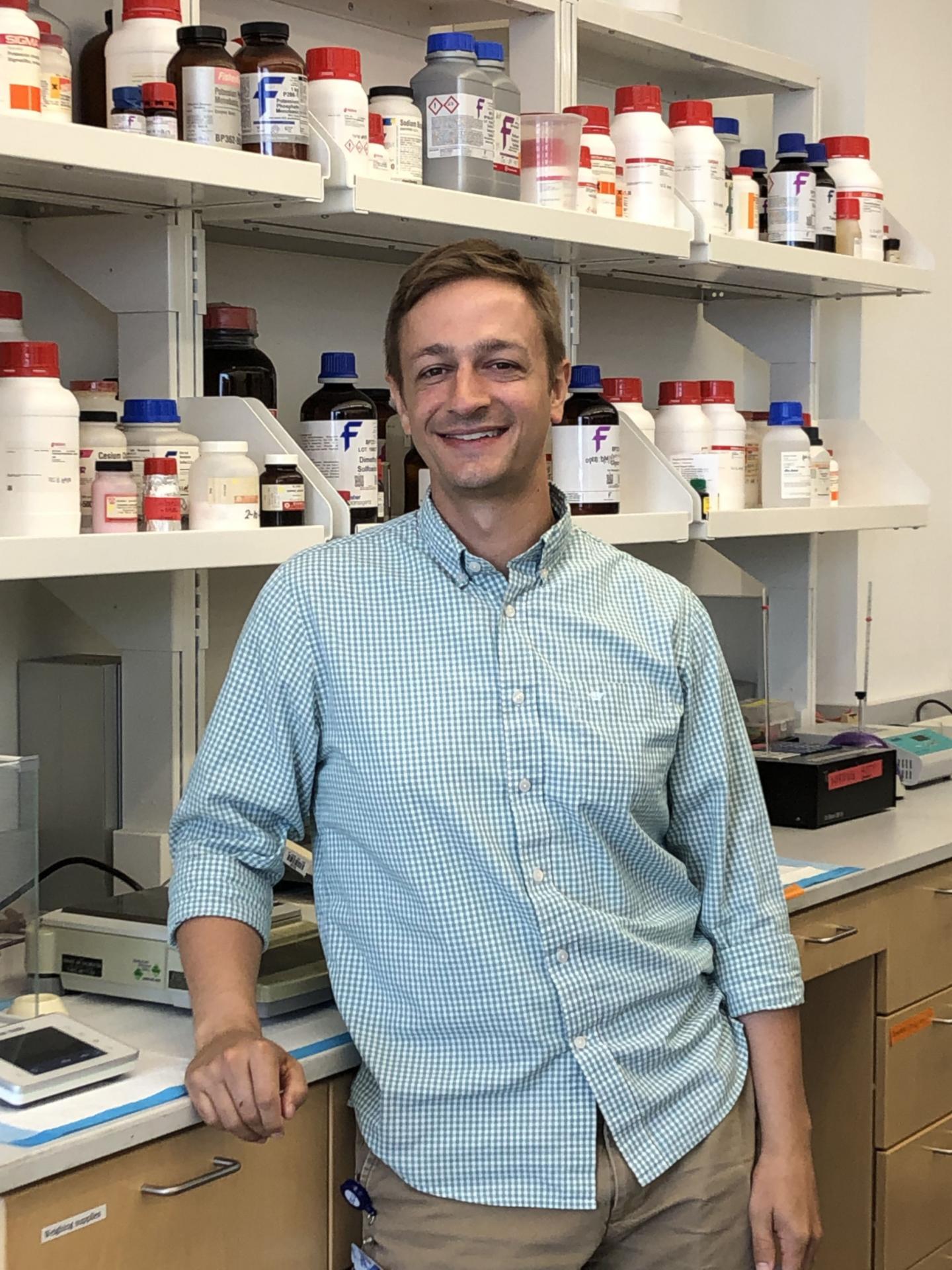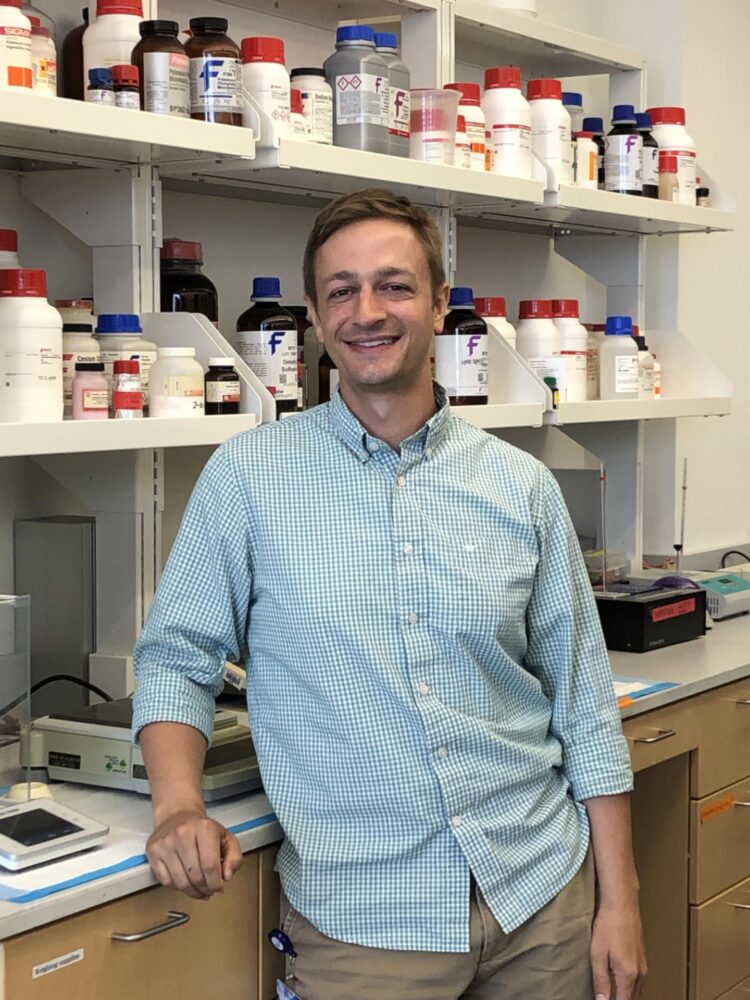
Credit: Saint Louis University
ST. LOUIS – Research from Saint Louis University finds that high fat or “ketogenic” diets could completely prevent, or even reverse heart failure caused by a metabolic process.
The research team, led by Kyle S. McCommis, Ph.D., assistant professor in Biochemistry and Molecular Biology at SLU, looked at a metabolic process that seems to be turned down in failing human hearts.
In an animal model, drastic heart failure in mice was bypassed by switching to high fat or “ketogenic” diets, which could completely prevent, or even reverse the heart failure.
“Thus, these studies suggest that consumption of higher fat and lower carbohydrate diets may be a nutritional therapeutic intervention to treat heart failure,” McCommis said.
The findings, “Nutritional Modulation of Heart Failure in Mitochondrial Pyruvate Carrier-Deficient Mice” were published online Oct. 26 in Nature Metabolism. This research, which was initiated during McCommis’ postdoctoral and junior faculty positions at Washington University School of Medicine, then was completed at Saint Louis University School of Medicine.
The heart’s myocardium requires vast amounts of chemical energy stored in nutrients to fuel cardiac contraction. To maintain this high metabolic capacity, the heart is flexible and can adapt to altered metabolic fuel supplies during diverse developmental, nutritional, or physiologic conditions. Impaired flexibility, however, is associated with cardiac dysfunction in conditions including diabetes and heart failure.
The mitochondrial pyruvate carrier (MPC) complex, composed of MPC1 and MPC2, is required for pyruvate import into the mitochondria. This study demonstrates that MPC expression is decreased in failing human and mouse hearts, and that genetic deletion of the MPC in mice leads to cardiac remodeling and dysfunction.
“Interestingly, this heart failure can be prevented or even reversed by providing a high-fat, low carbohydrate “ketogenic” diet,” McCommis said. “A 24-hour fast in mice, which is also “ketogenic” also provided significant improvement in heart remodeling.”
Diets with higher fat content, but enough carbohydrates to limit ketosis also significantly improved heart failure in mice lacking cardiac MPC expression.
“Our study reveals a critical role for mitochondrial pyruvate utilization in cardiac function, and highlights the potential of dietary interventions to enhance cardiac fat metabolism to prevent or reverse cardiac dysfunction and remodeling in the setting of MPC-deficiency,” McCommis said.
Ongoing studies will seek to uncover the importance of ketone body versus fate metabolism in this process of improved cardiac remodeling.
Take-aways
- Diets enriched with higher levels of fat but enough carbohydrate and protein to limit ketosis were also able to significantly improve or even prevent cardiac remodeling and dysfunction in a mouse model.
- These studies suggest that consumption of higher fat and lower carbohydrate diets may be a nutritional therapeutic intervention to treat heart failure.
- Like ketogenic diet, prolonged fasting increases the cardiac reliance on fatty acid oxidation and reduces ketolytic flux despite increased cardiac ketone body delivery. The 24-hour fast reduced blood glucose levels, and strongly enhanced plasma concentrations of non-esterified fatty acids and ketone bodies.
- Ketogenic diet consumption for only three weeks and the concordant increase in fat metabolism was associated with reverse remodeling of the failing hearts to essentially normal size.
- These results suggest that ketogenic diets do not enhance cardiac ketone body metabolism, but rather stimulates fatty acid oxidation, which may be responsible for the improved cardiac remodeling and performance.
###
This study is supported by the National Institutes of Health grants K99/R00 HL136658 (to KSM), R01 HL133178 (to RWG), and R01 HL119225 and R01 DK104735 (to BNF) supported these studies.
The work also was supported with core resources of the Nutrition Obesity Research Center, Diabetes Research Center and Institute for Clinical and Translational Sciences (ICTS) at the Washington University School of Medicine.
Other authors include Attila Kovacs, Department of Medicine, Washington University School of Medicine; Carla K. Weinheimer, Department of Medicine, Washington University School of Medicine; Trevor M. Shew, Department of Medicine, Washington University School of Medicine; Timothy R. Koves, Duke Molecular Physiology Institute, Duke University School of Medicine; Olga R. Ilkayeva of Duke Molecular Physiology Institute, Duke University School of Medicine; Dakota R. Kamm, Department of Biochemistry and Molecular Biology, Saint Louis University School of Medicine; Kelly D. Pyles, Department of Biochemistry and Molecular Biology, Saint Louis University School of Medicine; M. Todd King, Laboratory of Metabolic Control, National Institute on Alcohol Abuse and Alcoholism, National Institutes of Health; Richard L. Veech, Laboratory of Metabolic Control, National Institute on Alcohol Abuse and Alcoholism, National Institutes of Health; Brian J. DeBosch, Departments of Pediatrics and Cell Biology and Physiology, Washington University School of Medicine; Deborah M. Muoio, Duke Molecular Physiology Institute, Duke University School of Medicine; Richard W. Gross, Department of Medicine, Washington University School of Medicine and Department of Chemistry, Washington University in St. Louis; and Brian N. Finck, Department of Medicine, Washington University School of Medicine.
Veech passed away during the preparation of the manuscript.
Saint Louis University School of Medicine
Established in 1836, Saint Louis University School of Medicine has the distinction of awarding the first medical degree west of the Mississippi River. The school educates physicians and biomedical scientists, conducts medical research, and provides health care on a local, national and international level. Research at the school seeks new cures and treatments in five key areas: cancer, liver disease, heart/lung disease, aging and brain disease, and infectious diseases.
Media Contact
Maggie Rotermund
[email protected]
Original Source
https:/
Related Journal Article
http://dx.





